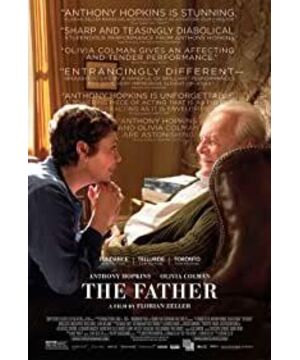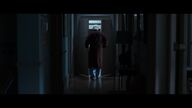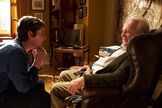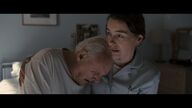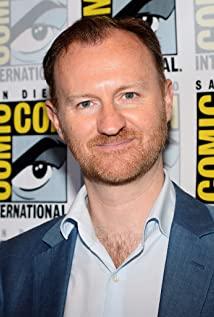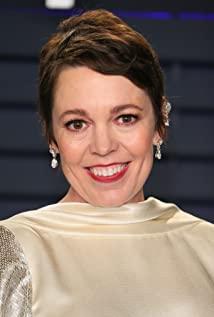"Anthony, that's a good name." At the end of "The Father" (The Father), the 83-year-old British dramatist Anthony Hopkins murmured this line as an audience member. It’s difficult for us to distinguish between people in the play and outsiders.
When the 40-year-old French playwright Florian Zeller conceived of adapting his representative work on stage into a movie, the actor candidate that came to mind was Anthony Hopkins. For this reason, he even used the male protagonist in the original script. The name was changed from Andre to Anthony, and it was decided to make the film in English rather than French. Then, he plucked up the courage to call Hopkins and invited him to star in his directorial debut. It is said that Hopkins immediately asked him: "Does it really make sense to use his name and real date of birth in the movie?"
A great actor certainly does not rely on such a simple way of substituting into the play. The director's ambition is directed at the audience-what he needs Hopkins to pay is courage, using his fear of disease and aging to drag the audience into reality and fiction. The chaotic zone in between -how many viewers rushed to look through the recent interview with the old man after watching the movie, confirming that he is still spirited, clear-headed, and inexplicably relieved.
Back to "Father Trapped in Time", this work was originally one of Zeller's "Family Trilogy" (the other two are "Mother" and "Son"), which premiered in Paris in 2012 He has performed in many countries around the world and has won the most important awards in European and American theater such as the Molière Award, the Oliver Award and the Tony Award. It has also consolidated Zeller's position as one of the most successful French Mesozoic playwrights. The story is inspired by the process of Alzheimer's disease in the grandmother who raised him. It injects real personal experience into the script, which impresses the audience.
But it is not easy to bring a drama that has been widely praised to the big screen. Zeller first directed the tube, with 6 Oscar nominations and 4 Golden Globe nominations, he became a hot spot in this year's awards season. "Usually when adapting a drama, the first advice people get is to add outdoor scenes to make it more cinematic. I decided not to do this." He mentioned the influence of Haneke's masterpiece "Love" in the interview. We can only focus on one apartment and two people and tell the story between them vividly, avoiding too much drama."
Zeller believes that his audience is well trained in film audiovisual language. First of all, the narrative of the movie version chooses to express the world in the eyes of Alzheimer’s patients completely from the perspective of the father: Anthony is always confused about whether he is in his own apartment or his daughter-in-law’s apartment, whether it is a clinic or a clinic. Nursing homes, not sure if their watches have been lost or stolen, are almost paranoid-the metaphor here undoubtedly points to the old man losing control of the world he lives in a little bit, and the dimensions of time and space are dissolving...
Secondly, the film tries to convey the confusion and helplessness of Alzheimer's patients through editing. Everything is enough to make everyone who empathizes feel vigilant, because it also means that the audience will also slide into uncertainty. abyss. "I believe that the audience is smart. I want the audience to feel like they are in a maze, trying to figure it out, trying to understand it, as if it is not just a story, but an experience—experiencing disorientation means What." Zeller spent much time on the interior setting. Although it is a single scene, he constantly makes subtle changes in the apartment environment and perspective, creating a mystery like David Lynch’s Mulholland Road. Illusion: The room is full of doors and corridors, forming a large number of symmetrical compositions in the layout of the house and the placement of furniture.
With the confusion of the elderly's consciousness, the furniture will become different, sometimes in position, sometimes in color. The picture of the little girl in the living room at the beginning of the film disappeared out of thin air, leaving only a deep mark on the wall. The plastic chairs in the waiting room appeared in a very uncoordinated home in the warmly decorated home one day; even at the end of the corridor The door opened today leads to the hospital ward, and tomorrow behind it will become an ordinary storage room. As the director expected, "It makes people so uneasy, like a jigsaw puzzle, one of which is constantly being lost." The kind of panic about strangers invading his room and the struggle for ownership are quite absurd dramatist Harold. · The taste of Pinter.
The film also further rendered the confusion and panic of the first-person perspective through other audiovisual means. For example, the apartment decoration has a relatively sharp contrast between warm and cold tones, which implies that Anthony's own apartment and daughter's residence are confused in Anthony's mind; in a relatively dark interior, a relatively single light source is used to outline the clear outline of the characters, which is expressionistic. The color of the light; the soundtrack of the film comes from the Italian composer Ludovico Aioddi (he is also the soundtrack of "A Place of Nowhere"), he adheres to the principle of "less is more", and even deliberately downplays the existence of music in the film Feeling (except for a few vivid arias that appear with passive sounds, which represent the sound in the old man’s earphones), Zeller was very satisfied: “It’s like the strings of a violin, or something very fragile... I just thought To feel very cautious and subtle-almost silent." All of the above standard features make the movie feel like a suspense thriller at first.
Except for the father and Olivia Coleman, who played Anthony's daughter, most of the other actors played two roles: Mark Gattis was son-in-law for a while, doctor in a nursing home for a while, and Olivia Williams for a while. She was the eldest daughter, and for a while she was a nursing home care worker. The personal care worker played by Imogen Puzi was also repeatedly mentioned by the old man that she looked like his little daughter... We can only piece together some truths: the little girl is loved, but After passing away early, the eldest daughter took care of her father for many years and was exhausted in the torture of family and love. His father's Alzheimer's disease became more and more serious, forcing the eldest daughter to finally decide to send him to a nursing home and entrust him to professional care.
The whole film lacks a reliable perspective from beginning to end, let alone linear narrative. Is it a bit cryptic? For viewers who follow Anthony’s chaotic perspective, if you find yourself in a maze in the first ten minutes, and you still don’t get out of the maze after watching the complete movie, then you will look back and wonder if you stop at ten minutes. ?
This is of course a point of view, but I think that after careful consideration, the overall narrative is still evolving. What's more, the truth is broken, but the remaining emotions are very real : the eldest daughter Anne's complex emotions when facing her father's unconcealed preference for the younger daughter, and the perseverance and struggle of whether to send her father to a nursing home; President Anthony It’s trying to show that I am in control of everything, but more and more frequently expose my deep inner doubts about myself, dependence on my eldest daughter, self-blame, the trembling sentence "I feel as if I'm losing "all my leaves...the branches and the wind and the rain" fully showed the fear of the wind and candle's dying years; at the end of the play, the old man's emotions collapsed, and the period of crying and finding his mother was called a "great performance", no need for it. Suspiciously, the audience’s attention is pulled from dismantling the narrative labyrinth to the core of perceiving emotion. The complete venting of emotion makes us stare again at the dark corridor in the apartment, like a time tunnel, where it comes from, is it The way home is also the end.
At this moment, who is crying somewhere in the world,
Cry in the world for no reason, cry me.
At this moment, who is laughing somewhere in the night,
Laugh at night for no reason, laugh at me.
At this moment, who is walking somewhere in the world,
Walked in the world for no reason and walked towards me.
At this moment, who is dying somewhere in the world,
Die in the world for no reason, looking at me.
-Rilke
Originally published in "Beijing Youth Art Review"
View more about The Father reviews


